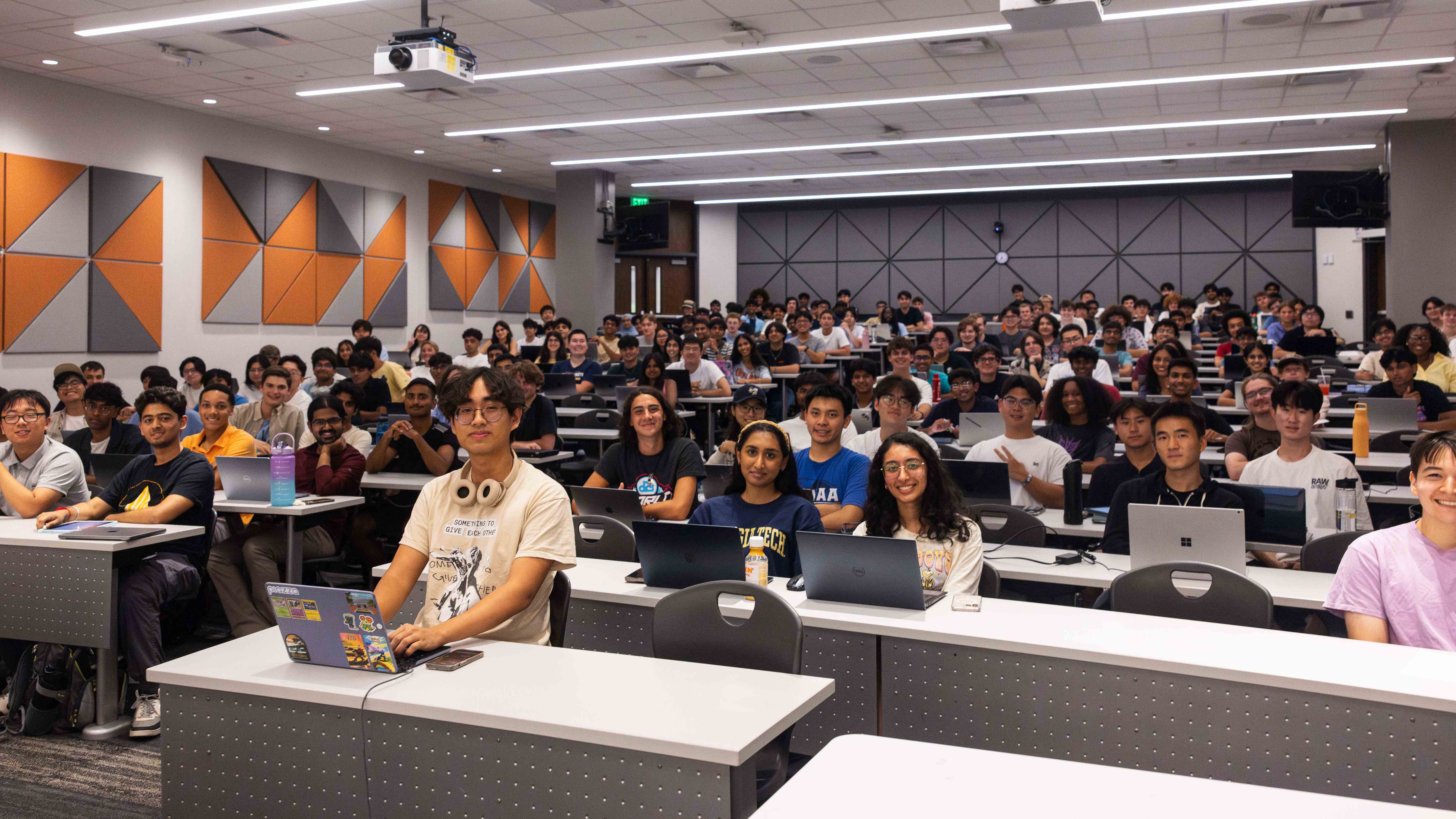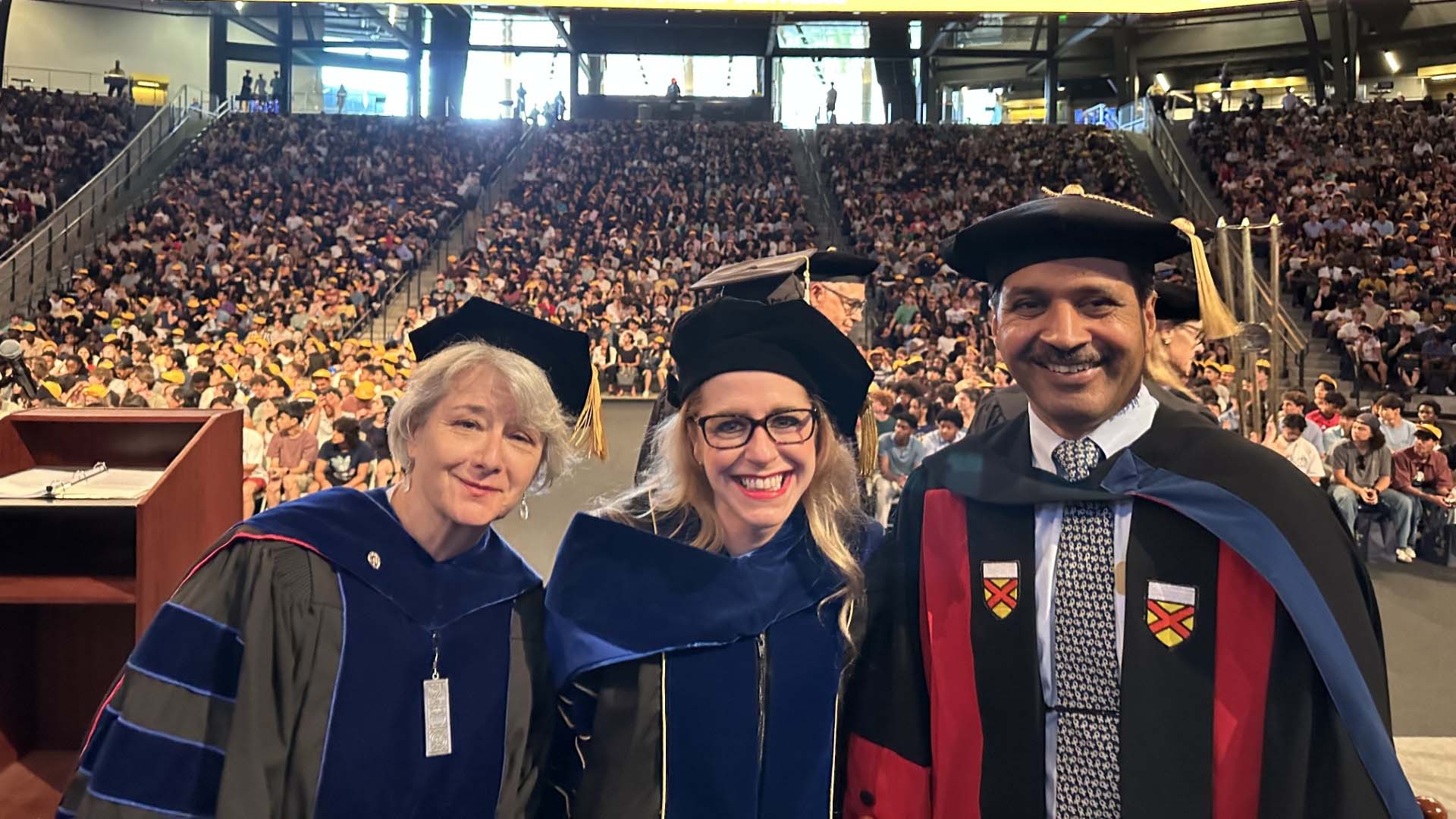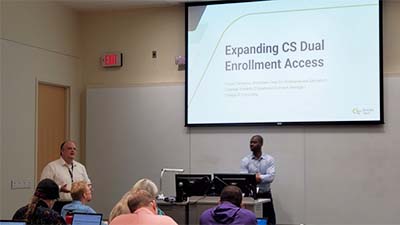
2025 Enrollment Roundup: Undergraduate Enrollment in Computing Remains Popular
Computer Science is Georgia Tech’s most popular major, with a significant number of incoming students pursuing computing-related majors this fall.
“The College has an amazing history when it comes to enrollment, and it’s worth telling that story year after year,” said Associate Dean for Undergraduate Education Olufisayo Omojokun.

A Standout Incoming Class
For the 2024–2025 academic year, Georgia Tech enrolled approximately 4,000 first-year students, with 16.5% planning to study computer science (CS) or computational media (CM), a joint major that spans the College of Computing, College of Design, and the Ivan Allen College of Liberal Arts.
Computer engineering, a joint major with the School of Electrical and Computer Engineering, represents 6.8% of all incoming students. Collectively, 23% of all incoming students on campus are studying a computing-related major.
This enrollment cycle drew 66,895 total applications, including 13,711 for CS and CM combined. CS continues to receive the largest share of applications to the College, accounting for 92.7% of applicants.
Competition remains high, with an admission rate for Computing that is lower than Georgia Tech’s already low overall admission rate.

According to Georgia Tech's Leading Insight Through Empowerment (LITE) August 2025 data, 1,547 first-year students were offered admission to study CS or CM beginning either in the Summer or Fall terms. 672 or 43% of these students committed and are actively enrolled this fall.
The class is geographically and academically diverse:
- 52% of CS students are from Georgia, representing 63 of 159 counties, while international admits are from 40 countries (see full lists below).
- The top five states for out-of-state students are California, Virginia, New Jersey, Florida, and Pennsylvania.
- 92% completed advanced calculus or higher in high school.
- 77% earned straight As throughout their high school careers.
- 54 incoming CS/CM students are Stamps Scholars.
The College also welcomed 53 transfer students and 58 Georgia Tech students changing majors to CS using the new application process introduced this year.
"It was heartwarming for me to see our new students at the Convocation and interact with them in their CS 1100 sections," said John P. Imlay Jr. Dean of Computing Vivek Sarkar.
“An exciting future awaits them with broad career options in multiple industries that go beyond tech companies.”

Early Global Experiences
Many incoming computing students are already engaging with global opportunities. For 2024–2025, two CS majors participated in the First-Year Semester Abroad in Oxford. Nine participated in Georgia Tech-Europe in Metz, France. A total of 100 first-year students across all majors began their semester abroad before transitioning to Atlanta.
Pathways to Georgia Tech Computing
The College offers multiple pathways to prepare students for the rigor of Georgia Tech’s computing programs.
Dual Enrollment
Georgia’s statewide dual enrollment program allows high school students to take college-level courses for both high school and college credit at no cost. At Georgia Tech, offerings include CS 1301, taught by Associate Dean for Off-Campus and Special Initiatives David Joyner, and CS 1331, taught by Omojokun.

“Through dual enrollment, the number of high school students accessing my class has grown to over 700 per year since 2020,” Joyner said. “That’s a radical expansion of access to CS education for Georgia high school students."
Bethany Mason, the College’s enrollment director, says the program plays a crucial role in promoting access.
“Even if you go to a high school that doesn’t offer a lot of AP classes, dual enrollment opens a catalog of advanced classes. It communicates to students that they’re not left out of the conversation,” said Mason.
IGNITE and Challenge
Georgia Tech programs like IGNITE and Challenge give computing students a strong head start on campus life.
In 2024–2025, 84 computing students participated in IGNITE’s optional summer start, combining coursework with social and cultural activities. The experience is like “summer camp meets college,” said Mason.
Challenge offers a similar program for students from underrepresented groups, with 20 computing students participating this year.
“These programs help students, especially those who did not get much exposure to computing in high school, build the confidence they need to succeed. When students arrive with a strong foundation, they can focus on engaging fully in both academics and campus life,” Omojokun said.
Extending Access and Engagement
Admissions is a year-round effort. During 2024–2025, the College hosted 35 in-person and 40 virtual information sessions, welcoming over 1,322 visitors.
“Our goal is to create a welcoming and informative experience for every prospective student and their family,” Mason said. “We aim to ensure that each program reflects the full spirit and opportunities within the College community.”
The College is also expanding distance learning and dual enrollment opportunities in rural counties through Georgia Tech’s Rural Computer Science Initiative, helping ensure access is not limited by geography.
Future Focus
As Fall 2025 begins, the College is welcoming a new cohort. Demand for a Georgia Tech CS degree remains high. Since 2013, the number of CS bachelor’s degrees awarded has increased by 388.62%, and the program’s top ten national ranking fuels further interest.
For the upcoming academic year, Change of Major applications will reopen on a limited basis, including opportunities to add CS as a second major. Leaders are also exploring expanded use of online learning platforms to give prospective and incoming students early exposure to Tech’s curriculum.
With momentum on its side, the College is poised to continue shaping the next generation of computational leaders.
Countries represented by incoming CS students: Argentina, Australia, Austria, Bangladesh, Brazil, Canada, China, Colombia, Costa Rica, Czech Republic, Denmark, Egypt, Finland, France, Germany, Ghana, Greece, Hong Kong, India, Indonesia, Ireland, Israel, Italy, Jamaica, Japan, Kenya, Malaysia, Mexico, Netherlands, Nigeria, Norway, Pakistan, Peru, Philippines, Poland, Singapore, South Korea, Spain, Sweden, Switzerland, Thailand, United Kingdom, Vietnam.
Counties represented by incoming CS students from Georgia: Barrow, Bibb, Bryan, Carroll, Catoosa, Chatham, Cherokee, Clarke, Clayton, Cobb, Colquitt, Columbia, Coweta, DeKalb, Dodge, Douglas, Echols, Fayette, Floyd, Forsyth, Fulton, Glynn, Gordon, Grady, Greene, Gwinnett, Hall, Hancock, Henry, Houston, Jackson, Jefferson, Long, Lowndes, Lumpkin, Monroe, Morgan, Muscogee, Newton, Oconee, Peach, Pickens, Pike, Putnam, Richmond, Spalding, Sumter, Taylor, Tift, Walker, Walton, Warren, White, Whitfield, Worth.
As computing revolutionizes research in science and engineering disciplines and drives industry innovation, Georgia Tech leads the way, ranking as a top-tier destination for undergraduate computer science (CS) education. Read more about the college's commitment:… https://t.co/9e5udNwuuD pic.twitter.com/MZ6KU9gpF3
— Georgia Tech Computing (@gtcomputing) September 24, 2024


